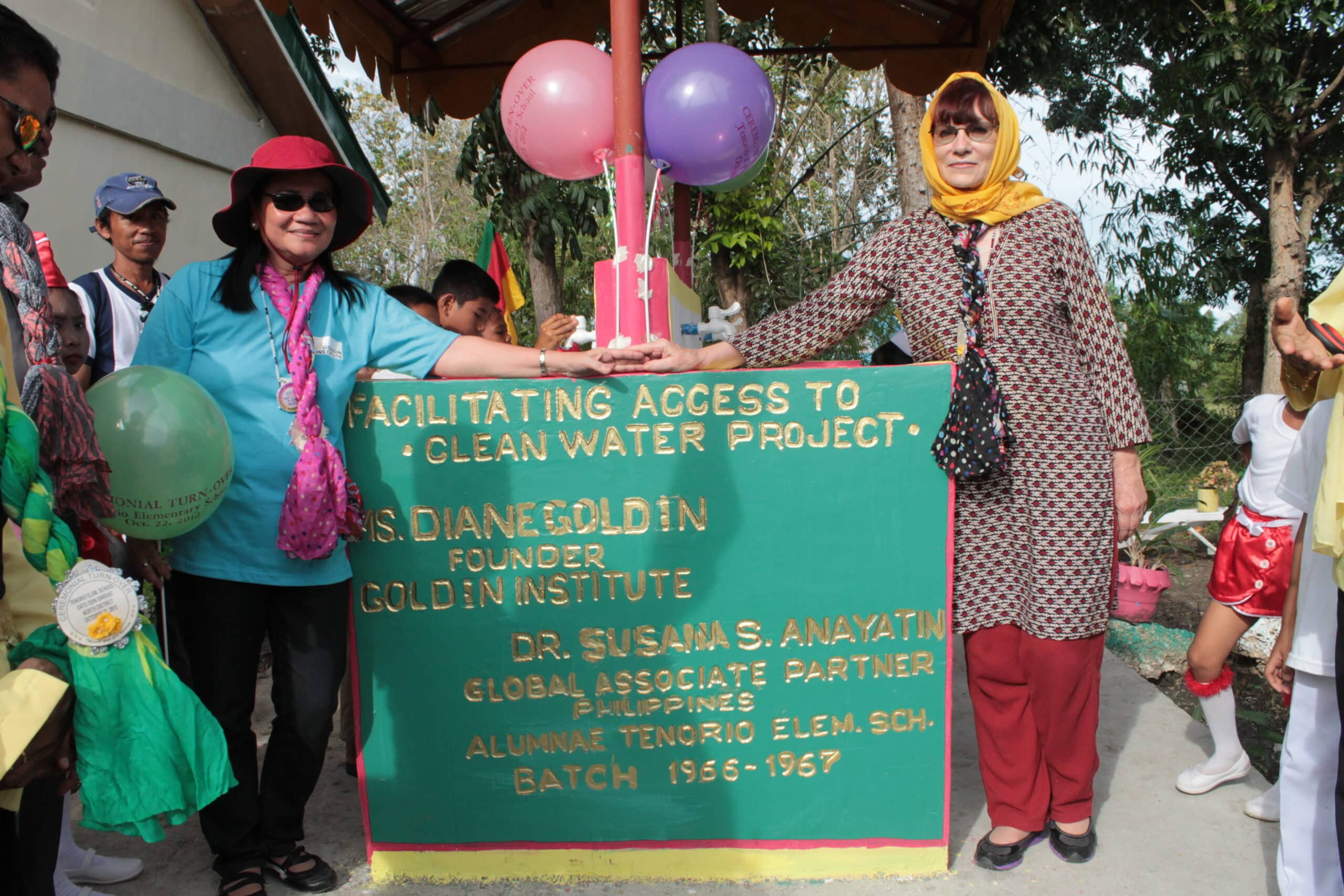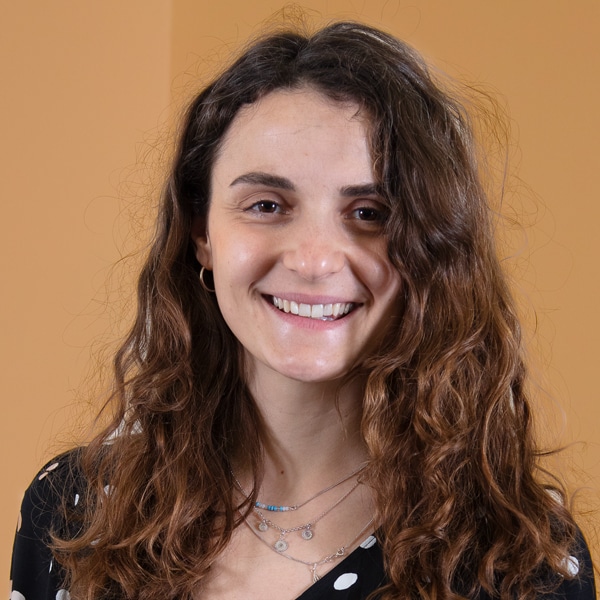Building Water Pumps, Peace, and Community
Dr. Susana Salvador Anayatin, a member of the Parliament of the Bangsamoro Transition Authority in the Philippines, has partnered with the Goldin Institute since its launch in 2002. Beginning with water pump installations in rural communities, Dr. Anayatin has since paved a path that is a testament to growth, positive change, and tireless activism in helping her community with peace and development initiatives through her community activism, institutional work, and joining forces with the Goldin Institute. Her engagement with the Goldin Institute inspires her to become more passionate about working for the welfare of the orphans and widows of war and the underserved sectors of our society.
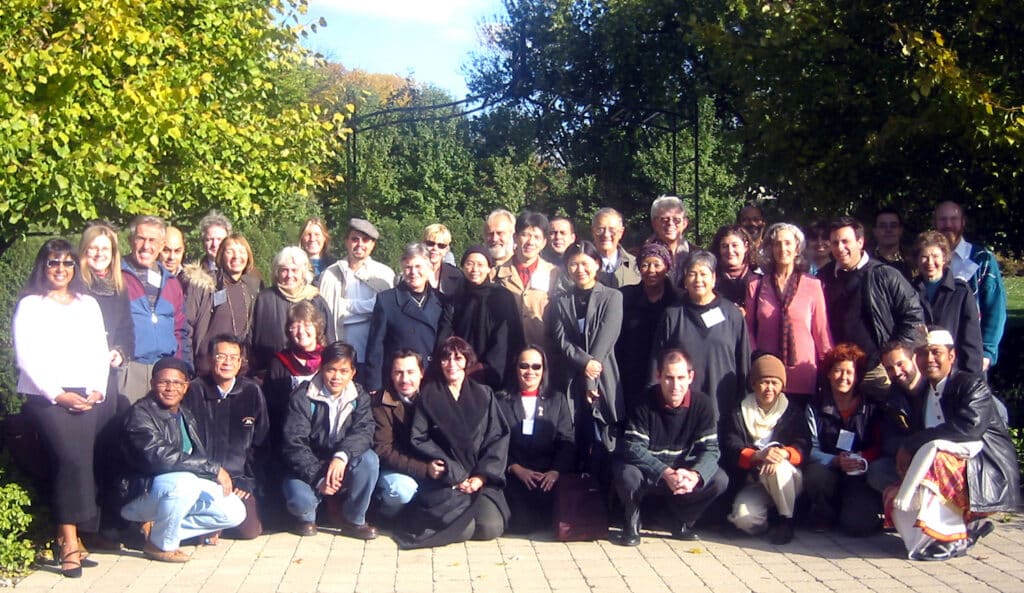
On a personal level, as a global associate of the Goldin Institute, Dr. Anayatin learned to become a global citizen by engaging with people from different countries. In this interview, she dwells more on these and how her motivation stems from personal tragedy, which she turned into strength and courage. She also touched upon impactful initiatives in the Philippines, emphasizing her transformative journey and dedication to peace-building efforts.
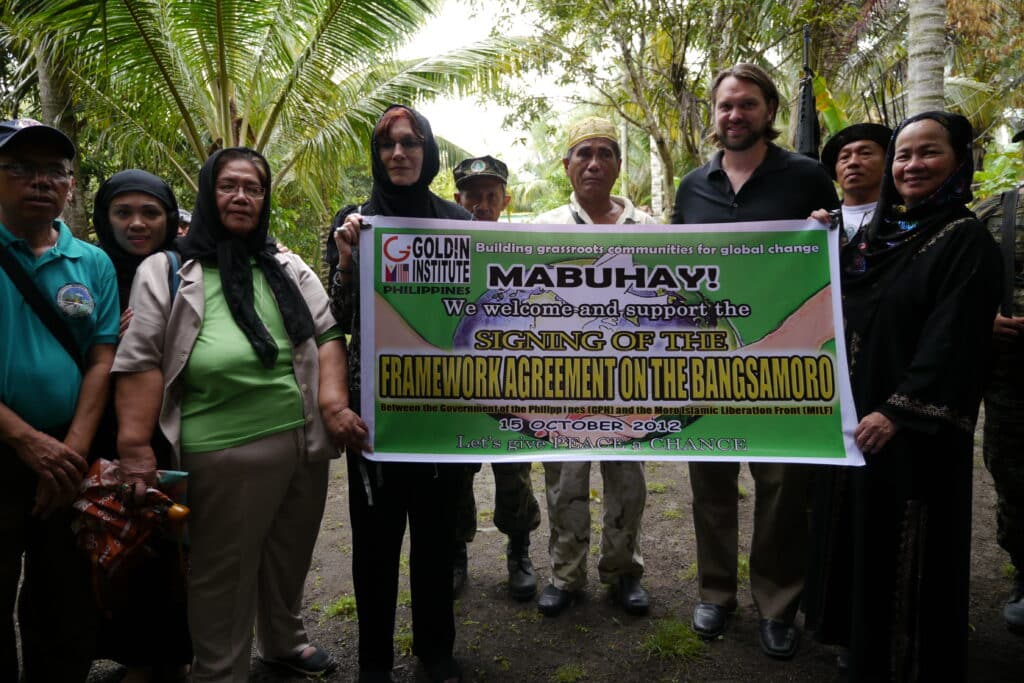
Journey with Goldin: Installing Water Pumps and Community Development
At the beginning of our conversation, she acknowledged that she gained education and skills in engaging with the Goldin Institute since partnering with grassroots communities. “I had a change of mindset. I now believe that peace and development are shared responsibilities between governments, private sectors, and grassroots communities, as they are all stakeholders of peace and development.”, she says. “I learned that through partnerships, we will yield more resources and services for the unserved and underserved in the communities.” Her values for volunteerism were also strengthened, alongside a more vital willingness to share skills to change lives, especially the out-of-school youth and illiterate adults.
She speaks about one initiative that evolved as part of the Goldin Institute’s work and its impact on helping the community with water pumps. “I was able to participate in a Goldin Institute Event in Taiwan about the provision of clean water, after which our team partnered on a project to provide water facilities in conflict-affected areas in Mindanao", she says.
Since that project, Dr. Anayatin has taken the installation of water pumps into her own hands. In three years, her organization installed about 430 water pumps in different schools, serviceable to school children and the adjoining communities. “This time, as a Member of the Bangsamoro Transition Authority Parliament, I could sustain the water project by saving some funds from our office. Since last year, we have constructed five water sources with hygiene and sanitation facilities in remote villages.”
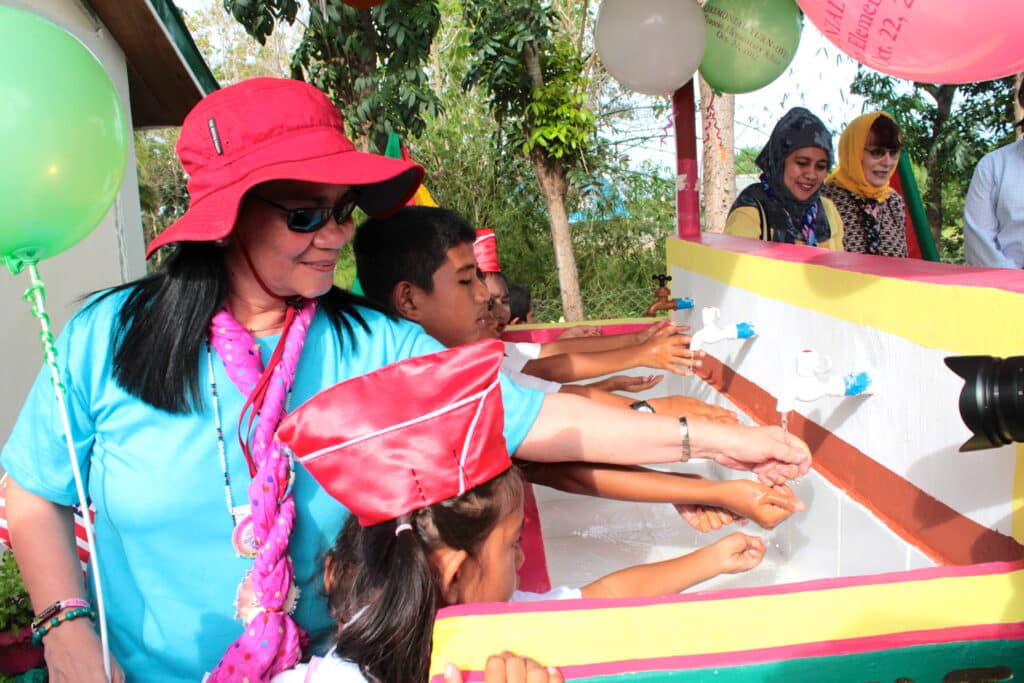
She is fortunate to have attended another Goldin Institute event about child soldier prevention in Colombia. “As a war orphan, I have been passionate about sharing some basic needs with war orphans here. We solicit food, school supplies, medicines, and clothes and bring them to orphanages. This time, since I have some sources, we take care of four orphanages, one home for older people, and a dormitory for disadvantaged students.” She further adds: “We are taking care of these war orphans because of their vulnerability to being recruited as child soldiers if they are left unschooled and homeless.”
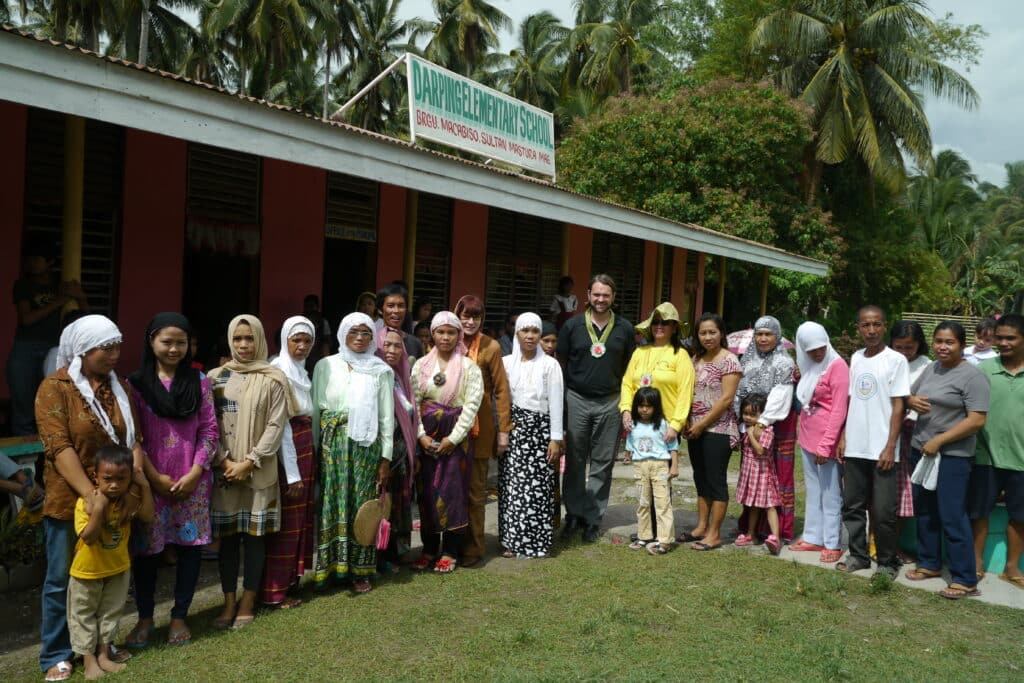
Turning a Personal Tragedy into Community Strength
Her motivation to get involved in peace and development work has its roots in a family tragedy- to which she did not surrender. “I am the daughter of activists who fought alongside the Americans against the Japanese Imperial Army during World War II. I became a war orphan because our father was killed in front of us in our house at the early stage of the armed conflict here in Mindanao.” Life has not been easy for her. “I had to work hard for my high school and college education at the backdrop of the armed conflict.”
Her brother, a policeman, was also killed brutally at the height of the kidnapping in Mindanao. “Despite poverty, I was able to finish college and landed a job in government. The loss of a father and a brother inspired me to join groups that advocate for peace, justice, human rights, and peaceful resolution of conflicts.”
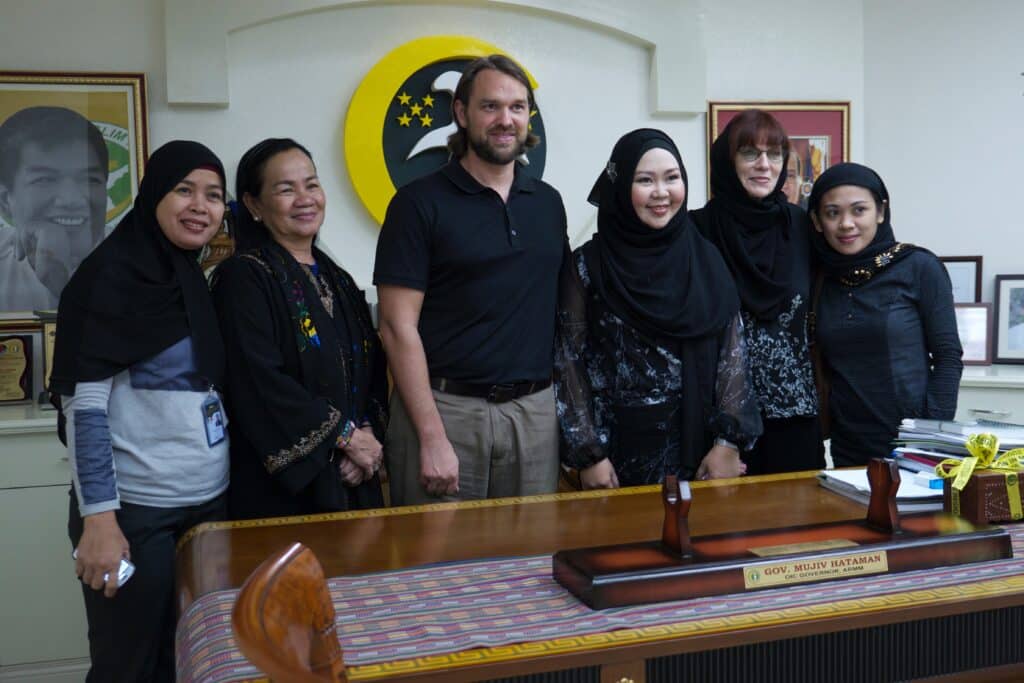
Sharing Decades of Learning: Peacebuilding as a Shared Vision and Dream
Dr. Anayatin shares with us also a key lesson she learned during her community-led peacebuilding work and efforts. There is a particular reaching that stands out to her as transformative. “I learned that peace is possible and that peacebuilding must not be dictated but a shared vision, dream, and passion where the stakeholders walk together along the journey.” She highlights that peace could be a lifetime process as a way of life.
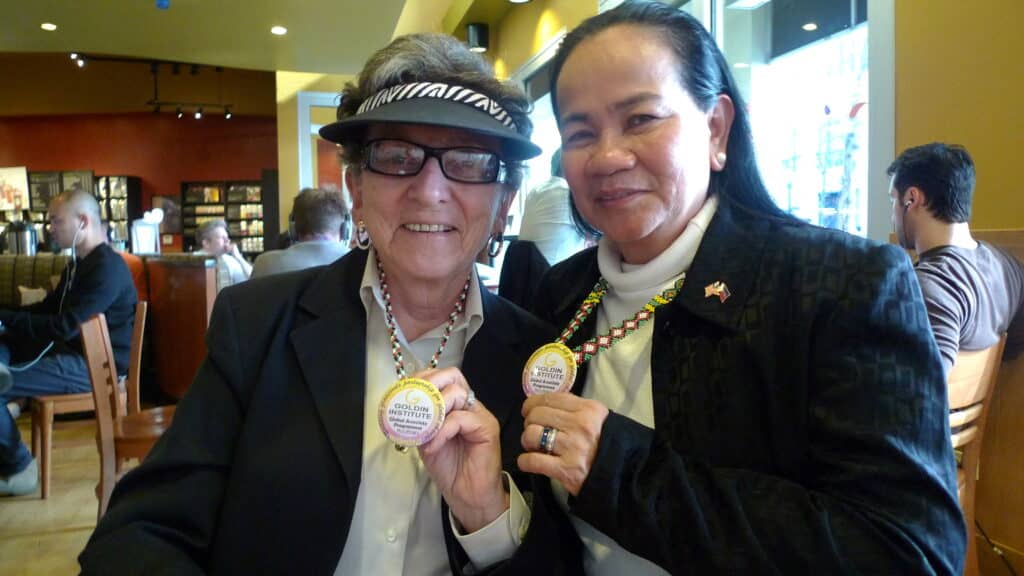
Speaking from her experience, she shares a mindset from which individuals and organizations working in peace can benefit. “Consultation must be conducted in project and activity planning. The environment of the communities is vital, from planning to implementation and monitoring of projects/activities to establishing ownership and sustainability.” she says. She draws attention to a crucial matter in the peace-building process and collective efforts to achieve that. “Peacebuilding is contextual. Culture, traditions, behavior, values, arts, et cetera matter and should be considered. Further, peacebuilding is a crucial factor for the success of peace initiatives.”
Spreading a Message of Hope and Unity
As the Goldin Institute recently celebrates its 21st anniversary, she notes the organization's most significant achievements. “The Goldin Institute created a platform for peace practitioners, academics, students, youth, and women to share knowledge, articles, and experiences in peacebuilding, conflict prevention, and post-conflict reconstruction. It established connections and reached people far beyond borders, especially in countries experiencing armed conflict and violent extremism. [...] People are interrelated regardless of creed, religion, ethnicity, political beliefs, and orientation. My experiences at the Goldin Institute allowed me to overcome the feeling of victimhood.” Concluding on a positive note, she recalls that now she enjoys a more peaceful life and is willing to journey and walk together with people from all walks of life.
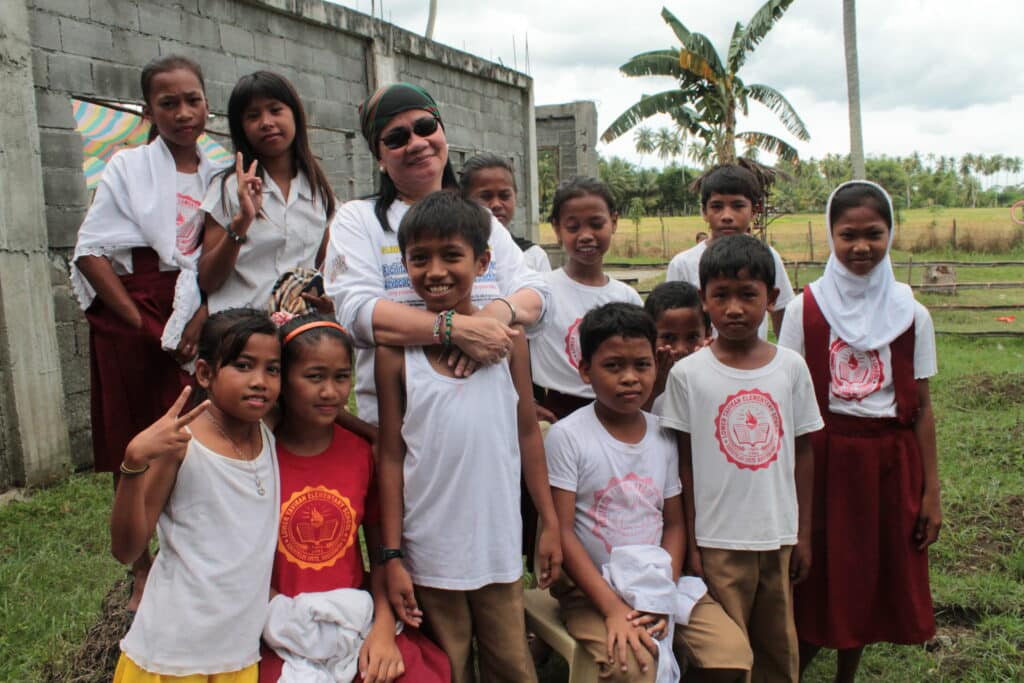
About Dr. Susana Salvador Anayatin:
Dr. Susana Salvador Anayatin pursued postgraduate studies in Peace and Development that enhanced her peace-building skills. She currently teaches Peace Education, both formal and informal, and one of the subjects is Conflict Resolution and Prevention of Violence Extremism. Most of her students and participants are youths, and she partners with local NGOs and the military since violent extremism is still an issue in Mindanao.
Philippines Update: Adopt a School of Peace Summit
Children Living in Conflict-Torn Region Would Benefit Directly From Proposed "Peace School"
As part of her ongoing work in Mindanao, Global Associate Dr. Susana Salvador-Anayatin hosted the Adopt a School of Peace summit in Cotabato City, Philippines on Mar. 23, 2011. Community leaders are engaging government officials, teachers, members of the military, former child soldiers and grassroots groups to create an elementary School of Peace and peace-studies curriculum for children living amidst the ongoing conflict in Mindanao.

In attendance were sixteen key influence makers and concerned organizers from the communities they serve, including former child soldier and current Goldin Institute Advisor Khanappi K. Ayao who welcomed the participants and set the tone for the day with his introduction:
[quote] It is our hope that this meeting will yield a positive response to pursue the project, Adopt a School of Peace in order to facilitate the long-awaited peace and development in our Province."[/quote]
 Also welcoming the attendees was Naguib G. Sinarimbo, the Executive Secretary and a direct representative for the Regional Governor of Mindanao (the Honorable Ansaruddin A. Adiong). He specifically thanked Dr. Anayatin and her work on behalf of the Goldin Institute for initiating the project, reminding the participants that "more than any other region in the Philippines, the (Mindanao) Province is an area most in need for all forms of assistance. Any undertaking that will support the regional government in attaining peace is welcome."
Also welcoming the attendees was Naguib G. Sinarimbo, the Executive Secretary and a direct representative for the Regional Governor of Mindanao (the Honorable Ansaruddin A. Adiong). He specifically thanked Dr. Anayatin and her work on behalf of the Goldin Institute for initiating the project, reminding the participants that "more than any other region in the Philippines, the (Mindanao) Province is an area most in need for all forms of assistance. Any undertaking that will support the regional government in attaining peace is welcome."
The School of Peace project has six specific objectives that would form the cornerstone for the proposed school:
- To develop modules for children in public and private schools in Mindanao that would promote non-discrimination; respect for other's beliefs, opinions and cultural practices, and an appreciation of the plurality of cultures and ideas in Mindanao.
- To teach children conflict resolution by teaching them with ways to work out differences and conflicts using peaceful means.
- To integrate the modules into relevant and appropriate core academic subjects.
- To develop and implement training courses for teachers to prepare them for using the modules in the classrooms.
- To equip teachers and parents with the knowledge and skills that they can use to train fellow teachers and parents in using the peace modules.
- To establish the mechanisms that will ensure the sustainability of the project.
Some background of the Province and the current atmosphere for conflict was summarized and gave reference to how the six objectives should be thought of when considering the overall approach to the Peace School plan:
In the context of Mindanao, Philippines, a tri-people land, differences in culture and ideology abound. There is a beauty in the differences if each would respect each other. But reality paints a different picture. A child may hear a slur about Christians or Muslim or Indigenous Peoples from his or her family. He or she may even be warned against relating to those different from them – warning their children that the others cannot be trusted. The teachers themselves, who also grew up hearing the same, sometimes reinforce those beliefs and fears in school.
But we believe that the school is still the primary venue to learn good values, morals, and positive life skills. These should be venues that would promote respect, acceptance, an an appreciation of the differences of beliefs, culture and opinions. These are venues where cooperation and constructive conflict resolution should be practiced and upheld.
It is in this light that we are proposing to adopt a School of Peace – elementary level, located at a nearby conflict-affected area in the Maguinanao Province in Mindanao, Philippines. Modules to be developed will guide teachers on how to discuss the concepts of peace, human rights and conflict resolution in their classrooms. The main part of the Modules leads teachers to explore and reflect on the concepts and issues related to peace building.
Six topics to be introduced as essential to building a Culture of Peace:
- Achieving Personal Peace
- Dismantling Structural Violence
- Respecting Human Rights
- Looking to the past to find Peace Models
- Selecting Peaceful Ways in Dealing with Conflict
- Exploring the Relationship between Nature and Peace
